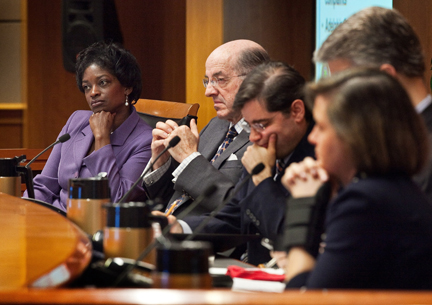Court decision jeopardizes equal Internet access
By Angela Penny
The Guardsman

A U.S. court of appeals overruled the Federal Communications Commission policy to protect “network neutrality” on April 6.
The court’s decision allows Internet service companies to block or slow specific sites, while at the same time potentially charge other sites to deliver content faster to users.
Network neutrality is the idea that websites should be delivered to Internet subscribers at equal speed for the same price, thus ensuring freedom of access and authorship on the Web.
“Network neutrality is the only thing that ensures that Internet service providers can’t decide whose voice will be heard,” said Langford Poh, production director at the City College radio station, KCSF. “We are an independent station. If Clear Channel or some other big media company were to say to Comcast ‘I will pay you X amount of dollars to ensure that my radio stations are given preference over all others,’ there’s no way that we could compete.”
The United States Court of Appeals for the District of Columbia Circuit ruling was a reversal of action taken by the FCC in 2008 when, in response to customer complaints, the commission ordered Comcast to stop blocking users from BitTorrent, a peer-to-peer sharing application.
Supporters of net neutrality, including FCC Chairman Julius Genachowski, seek to require companies to give Internet users equal access to all content, even if some of that content uses a large amount of bandwidth.
Comcast, the nation’s largest cable provider, according to the New York Times, and other major ISPs argue they must regulate sites that use excessive bandwidth as part of their network maintenance.
“The problem is that, the backbone of the Internet itself, we all own that because it’s paid for with taxpayer money,” City College broadcasting instructor Cecil Hale said. “Private companies like Comcast, At&T and the rest of them are trying to monetize it.”
According to the New York Times, some consumer advocates have urged the commission to reclassify Internet service from its current designation as a communications service, over which the FCC has limited regulatory authority, to a utility category like telephone service, which the agency has the clear authority to regulate.
Genachowski told a congressional panel the FCC plans to broadly expand the country’s high-speed Internet service. He refused to say if the commission would try to overcome the court decision by reclassifying Internet service as a utility.
“I have the philosophy that it’s better to have a parent at a kid’s birthday party handing out pieces of cake, rather than let all the kids dive in face first to get as much cake as they can.” City College broadcasting instructor Misha Antonich said.
He said the decision might primarily affect students’ experience with the Internet when using it at home. At this point, there is speculation that ISPs may institute a tiered system where customers would pay more to receive information faster.
Comcast, however, claims it is committed to the FCC’s open Internet principles.
“We will continue to work constructively with this FCC as it determines how best to increase broadband adoption and preserve an open and vibrant Internet,” Comcast stated following the decision.
Representative Michelle Bachman, R-Minn., attacked net neutrality on an April 19 Fox News broadcast.
“The Democrats want to censor everything on the Internet that does not serve their purposes,” she said.
